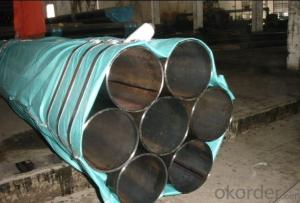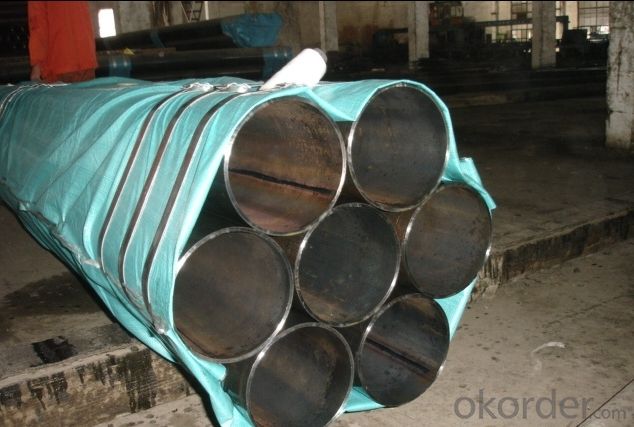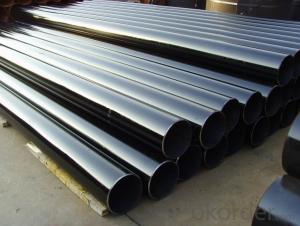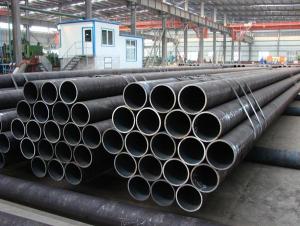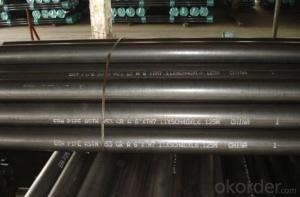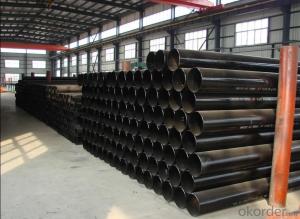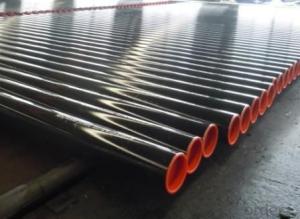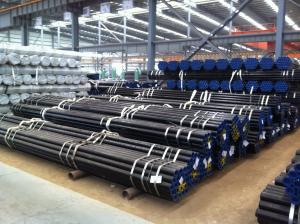ERW Steel Pipe API 5L hot sell you can find
- Loading Port:
- Tianjin
- Payment Terms:
- TT or LC
- Min Order Qty:
- 25 m.t.
- Supply Capability:
- 6000 m.t./month
OKorder Service Pledge
OKorder Financial Service
You Might Also Like
1、Structure of ERW Steel Pipe API 5L:
ERW Steel Pipe API 5L is formed by drawing a solid billet over a piercing rod to create the hollow shell. As the manufacturing process does not include any welding, and perceived to be stronger and more reliable.
2、Main Features of ERW Steel Pipe API 5L:
• Small inertia resistance
• Strong heat dissipation ability
• Good visual effect
• High manufacturing accuracy
• Power strength
3、ERW Steel Pipe API 5L Specification:
Standard | GB, DIN, ASTM ASTM A106-2006, ASTM A53-2007 |
Grade | 10#-45#, 16Mn 10#, 20#, 45#, 16Mn |
Thickness | 8 - 33 mm |
Section Shape | Round |
Outer Diameter | 133 - 219 mm |
Place of Origin | Shandong, China (Mainland) |
Secondary Or Not | Non-secondary |
Application | Hydraulic Pipe |
Technique | Cold Drawn |
Certification | API |
Surface Treatment | factory state or painted black |
Special Pipe | API Pipe |
Alloy Or Not | Non-alloy |
Length | 5-12M |
Outer Diameter | 21.3-610mm |
Grade | Q345, API , A53B |
Standard | ASME, ASTM |
1) Material:20#(ASTM A 106/A53 GRB.API5LGRB,GB),45#,16Mn,10#.
2) Specification range:OD:21.3-610mm,WT:6-70mm,length:6-12m or according to the requirement of clients.
3) Excutive standards:GB,ASME API5L.ASTM A 106/A53,Despite of the above standards,we can also supply seamless steel pipe with standard of DIN,JIS,and so on,and also develop new products according to the requirements of our clients!
4) Surface:black lacquered,varnish coating or galvanized.
4、Packaging & Delivery
Packaging Details: | seaworthy package,bundles wrapped with strong steel strip |
Delivery Detail: | 15-30days after received 30%TT |
5、FAQ of ERW Steel Pipe API 5L:
①How is the quality of your products?
Our products are manufactured strictly according to national and internaional standard, and we take a test
on every pipe before delivered out. If you want see our quality certifications and all kinds of testing report, please just ask us for it.
Guaranteed: If products’ quality don’t accord to discription as we give or the promise before you place order, we promise 100% refund.
②How about price?
Yes, we are factory and be able to give you lowest price below market one, and we have a policy that “ for saving time and absolutely honest business attitude, we quote as lowest as possible for any customer, and discount can be given according to quantity”,if you like bargain and factory price is not low enough as you think, just don’t waste your time.Please trust the quotation we would give you, it is professional one.
③Why should you chose us?
Chose happens because of quality, We can give you both.Additionally,we have professional sales team and professional cooperators and partners, and we can also offer professional products inquiry, products knowledge train(for agents), smooth goods delivery, exellent customer solution proposals.Our service formula: good quality+good price+good service=customer’s trust
SGS test is available, customer inspection before shipping is welcome, third party inspection is no problem.
6、ERW Steel Pipe API 5L Image:
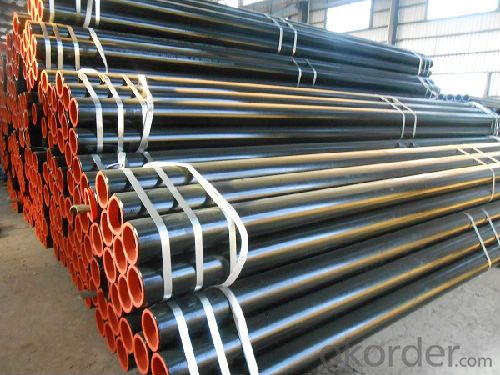
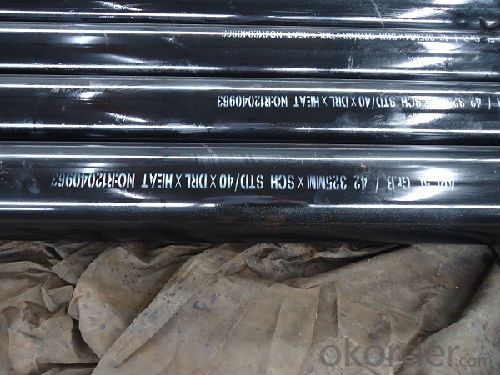
- Q: How are steel pipes used in the manufacturing of HVAC systems?
- Steel pipes are commonly used in the manufacturing of HVAC systems for various purposes. They are primarily used for transporting fluids such as water, refrigerants, and gases throughout the system. Steel pipes provide durability and strength, ensuring the safe and efficient transfer of these substances. Additionally, steel pipes are often used for structural support, acting as a framework for the HVAC system. Overall, steel pipes play a crucial role in the manufacturing of HVAC systems by facilitating fluid transportation and providing structural stability.
- Q: How are steel pipes protected against soil movement?
- Steel pipes are protected against soil movement through the use of various measures such as proper installation techniques, trench stabilization, and the implementation of protective coatings. Additionally, the pipes may be anchored or encased in concrete to prevent movement or damage caused by shifting soil.
- Q: What are the different end finishes available for steel pipes?
- Some of the different end finishes available for steel pipes include plain ends, beveled ends, threaded ends, grooved ends, and flanged ends.
- Q: Can steel pipes be used for pharmaceutical manufacturing plants?
- Yes, steel pipes can be used for pharmaceutical manufacturing plants. Steel pipes are commonly used in pharmaceutical manufacturing plants due to their durability, resistance to corrosion, and ability to withstand high pressure and temperature conditions. Additionally, steel pipes can be easily cleaned and sanitized to meet strict hygiene standards required in pharmaceutical production.
- Q: What is the difference between standard wall thickness and extra-strong wall thickness steel pipes?
- The main difference between standard wall thickness and extra-strong wall thickness steel pipes lies in their thickness and durability. Standard wall thickness pipes have thinner walls and are suitable for most general applications, while extra-strong wall thickness pipes have thicker walls and are designed for heavy-duty or high-pressure applications. These extra-strong pipes offer enhanced strength and resistance, making them more reliable and suitable for handling extreme conditions or demanding projects.
- Q: How are steel pipes used in the transportation of fluids?
- Steel pipes are commonly used in the transportation of fluids due to their durability, strength, and corrosion resistance. They are used in various industries, including oil and gas, water supply, and chemical processing, to transport liquids and gases over long distances. The seamless construction of steel pipes ensures a smooth flow of fluids, reducing friction and pressure loss. Additionally, their ability to withstand high temperatures and pressures makes them ideal for transporting fluids safely and efficiently.
- Q: Are steel pipes suitable for use in food processing industries?
- Yes, steel pipes are suitable for use in food processing industries. They are highly durable, corrosion-resistant, and can withstand high temperatures and pressure. Additionally, steel pipes are easy to clean, maintain hygiene standards, and do not contaminate the food being processed.
- Q: How are steel pipes protected against microbial corrosion?
- Steel pipes are protected against microbial corrosion through various methods. One common method is the use of coatings on the pipe's surface. These coatings act as a barrier between the steel and the surrounding environment, preventing the entry of microbes and their corrosive byproducts. Coatings such as epoxy, polyethylene, and fusion bonded epoxy are often applied to the pipes to provide this protection. Another method is the use of corrosion inhibitors. These inhibitors are added to the fluid flowing through the pipe to inhibit microbial growth and prevent corrosion. These inhibitors can be organic or inorganic compounds that work by either killing the microbes or inhibiting their metabolic activity. Additionally, proper maintenance and cleaning of the pipes are crucial in preventing microbial corrosion. Regular inspections and cleaning can help remove any biofilms or microbial deposits that may have formed on the pipe's surface. This reduces the potential for microbial corrosion and extends the lifespan of the pipes. In some cases, cathodic protection may also be employed. This involves the use of sacrificial anodes or impressed current systems to provide a protective electrical current to the pipe. This current helps to prevent the formation of corrosive microorganisms and protects the steel from corrosion. Overall, a combination of coatings, corrosion inhibitors, regular maintenance, and cathodic protection techniques are used to protect steel pipes against microbial corrosion. These strategies help to ensure the longevity and integrity of the pipes in various industries, such as oil and gas, water supply, and sewage systems.
- Q: What are the different types of steel pipe coatings for chemical processing plants?
- There are several types of steel pipe coatings commonly used in chemical processing plants, including epoxy coatings, polyethylene coatings, and fusion-bonded epoxy coatings. These coatings provide protection against corrosion and chemical damage, ensuring the longevity and safety of the pipes in such environments.
- Q: What is the lifespan of galvanized steel pipes?
- The lifespan of galvanized steel pipes can vary depending on various factors such as the environment, usage, and maintenance. However, on average, galvanized steel pipes can last between 40 to 70 years.
Send your message to us
ERW Steel Pipe API 5L hot sell you can find
- Loading Port:
- Tianjin
- Payment Terms:
- TT or LC
- Min Order Qty:
- 25 m.t.
- Supply Capability:
- 6000 m.t./month
OKorder Service Pledge
OKorder Financial Service
Similar products
Hot products
Hot Searches
Related keywords
